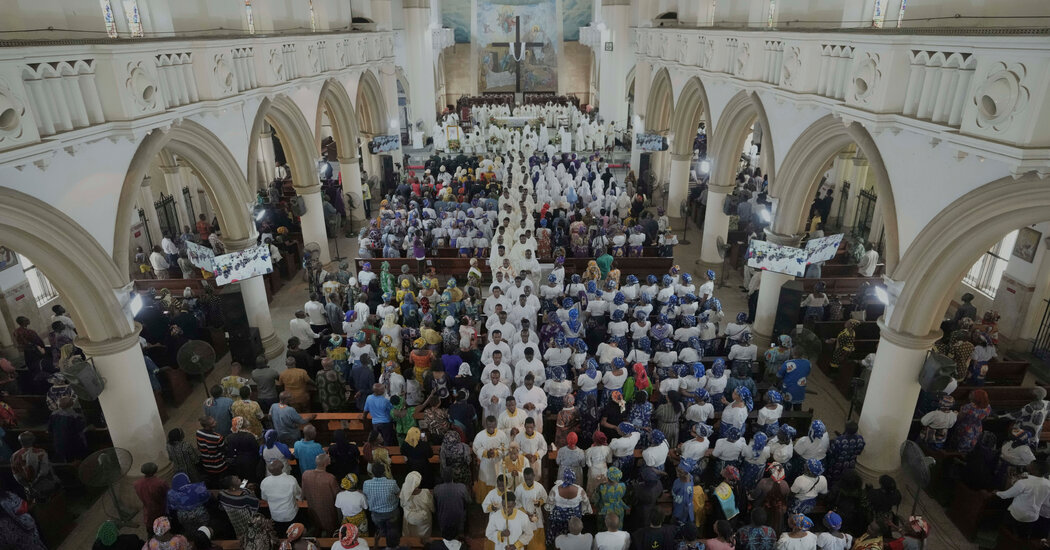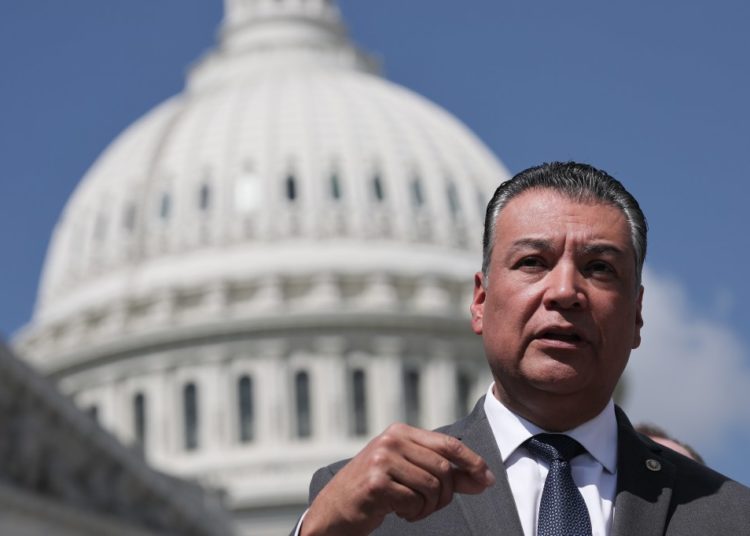President Trump has joined a chorus of alarm about an “existential threat” to Christianity in Nigeria, warning this weekend that the United States would deploy troops or carry out airstrikes if Nigeria’s leaders didn’t “move fast” to stop the violence.
The accusations have been fueled in part by a wave of indiscriminate attacks by violent armed groups and Islamist insurgents over decades. More than 8,000 civilians in Nigeria — Christian and Muslim alike — have been killed so far in this year alone, according to recent data compiled by independent monitoring groups.
There is no clear evidence to show that Christians are attacked more frequently than any other religious group in Nigeria, much less an attempt at “genocide,” analysts say. But violence and land disputes have deep roots in the country. In one region where many Christians have been killed, the Middle Belt, territorial disputes between mostly Christian farmers and mostly Muslim herders have devolved into bloody land grabs.
Now, that violence has put Nigeria in Mr. Trump’s cross hairs, as officials in the country scramble to counter what they say is a false narrative that could incite civil war and cripple one of Africa’s largest economies.
“We don’t want to be the next Libya, we don’t want to be the next Sudan,” said Yusuf Tuggar, Nigeria’s foreign minister, referring to two African nations that were splintered by devastating conflicts in recent decades. “It is not in the interests of the rest of the world for Nigeria to be pushed to the precipice.”
Mr. Tuggar called on Washington to support Nigeria’s democracy instead of “attempting to break us up and turning us into a failed state.”
Mohammed Idris, the information minister, said in a statement that claims of Christian persecution in Nigeria are “false, baseless, despicable, and divisive.”
“Christianity is neither endangered nor marginalized in Nigeria,” he said. Indeed, Nigeria is home to Africa’s largest Christian population, according to Pew Research, and is one of the world’s biggest. There are more than 90 million Christians in Nigeria, on par with Mexico and the Philippines.
While Christians may not be singled out, vulnerable Nigerians of all faiths have been forced to endured unrelenting violence. Boko Haram terrorizes communities in the northeast, bandits kidnap people for ransom in the northwest, secessionist conflicts rage in the southeast and gunmen for hire roam the Middle Belt.
Some Nigerians say the security forces within the government of President Bola Ahmed Tinubu have done little to stop the killing, and in some cases have even facilitated it.
Mr. Tinubu on Saturday defended his country’s protection of religious groups, saying on social media that “Nigeria stands firmly as a democracy governed by constitutional guarantees of religious liberty.”
The country’s national security adviser, Nuhu Ribadu, recently accused soldiers and the police of selling and hiring out their weapons to “bad people,” aiding the proliferation of small arms and posing a major threat to national security.
Violence in Nigeria this year is only surpassed by Sudan and Somalia, said Ladd Serwat, a senior analyst at the Armed Conflict Location & Event Data group, citing two of Africa’s most devastated war zones. The violence in Nigeria’s far exceeds the level in other countries with active insurgencies, like Burkina Faso and Mali, he said.
Faith-based groups around the world have consistently sounded the alarm about the country’s Christian victims. They have called attention to cases, like that of Leah Sharibu, a Christian girl kidnapped by Boko Haram, that have become rallying cries for Christians in the United States.
In the country’s worst massacre on a single day in recent history, around 200 people were killed in June in Benue, a predominantly Christian area, when armed men stormed the village of Yelwata, prompting Pope Leo to condemn the “terrible massacre.”
Titus Gsegba’s father, wife and four of his children were killed in that attack. He was in a neighboring village for the night. “Around midnight we heard gunshots, then saw flames rising from Yelwata,” said Mr. Gsegba, a Christian farmer. “When I went there, I found almost all the houses destroyed. My wife was burned alive in the store where she was hiding.”
Metropolitan cities like Lagos, home to vast Christian congregations, appear to tell a different story. On Sunday, after Mr. Trump issued his initial threat against Nigeria, Ole Wale, a petrochemical engineer in Lagos, pointed out that many Christians had peacefully attended church in the city that morning. Mr. Wale, 32, said that the president and his allies had read too many “exaggerated” social media posts.
“It’s not true that we’re fighting against Christianity or that Christians in Nigeria are wary,” he said.
Attacks on Muslims in the country often receive far less attention within Nigeria and globally, even though they have been killed by the tens of thousands, with groups like Boko Haram preying on Muslim communities.
A month after the attack in Benue, dozens of hostages in the predominantly Muslim northwestern state of Zamfara were killed, despite having paid ransoms demanded by their kidnappers. Others were released. One of them, a Muslim woman, described being dragged from her home one night in April alongside dozens of her neighbors, whipped as she struggled to walk barefoot through the forest to her abductors’ hide-out, and then starved and beaten for months.
“Some never survived those beatings,” said the woman, who was granted anonymity for fear of reprisals from both her attackers and the government. “They died right before our eyes.”
Abductees from the Zamfara village attack said that 54 people were taken. But only 22 made it out alive in July, when their ransoms were paid. Some were executed. Some died in a torrential downpour, tied up and weak from months of neglect. Others starved.
“Food came only once a day, sometimes not at all. I remember a stretch when the food ran out completely — four whole days passed and we ate nothing,” said the woman. “Hunger gnawed at us, beating tore at our flesh. That was our daily reality.”
Another Muslim survivor, who was also granted anonymity, said he was held by men who “slaughtered without hesitation,” and he watched his brother die in captivity. The screams and beatings replay daily in his head, he said. His possessions were all either stolen or sold to pay his ransom, and he is trying to rebuild his life. But, he said: “The pain of captivity lives inside me.”
Many security analysts say Nigeria should prosecute more perpetrators and hold government officials responsible for ongoing security failures. “Not one single person has been held accountable for the security lapses,” said Kabir Adamu, a security analyst, referring to several recent massacres. “Not even a query to say: ‘This happened under your watch, why did you allow that to happen?’”
He added that government funds intended to pay for security measures were frequently stolen, and officials almost never faced consequences for attacks on communities they were responsible for protecting. Last year, the head of the National Bureau of Statistics was briefly detained after the agency reported that more than 600,000 people had been killed in one year. He later withdrew the report, claiming the agency’s website was hacked.
Mr. Tinubu won the 2023 election partly on a promise to tackle Nigeria’s myriad security crises, and this year his administration claimed to have “eliminated” more than 13,500 terrorists.
Much of the focus has been on the Middle Belt, where local leaders describe a tit-for-tat cycle of violence between Christian farmers, who are mostly from the Tiv and Berom ethnic groups, and Muslim herders, who are mostly from the Fulani ethnic group.
“The killings in the Middle Belt are getting out of hand,” said Isa Sanusi, the executive director of Nigeria’s branch of Amnesty International, which said in May that two states in that region accounted for 93 percent of the 10,000 people killed by bandits in Mr. Tinubu’s first two years in office.
Human rights groups and analysts say the herder-farmer divide masks an urgent economic problem. The violence is causing many farmers to abandon their fields, threatening the modest growth Nigeria’s economy registered last year after suffering the worst economic crisis in a generation.
Some Nigerians said they hoped the attention from Washington would pressure their government to do more to stop the killings. After reading Mr. Trump’s social media post over the weekend, Bianca Comfort, 35, an entrepreneur from Abuja, the capital, said that she hoped Mr. Trump’s words would push Nigeria to fight terrorist groups like Boko Haram more aggressively, as the group resurges in the northeast.
“It might make a change,” she said.
Alex Marshall and Dickson Adama contributed reporting.
Ruth Maclean is the West Africa bureau chief for The Times, covering 25 countries including Nigeria, Congo, the countries in the Sahel region as well as Central Africa.
Saikou Jammeh is a reporter and researcher for The Times based in Dakar, Senegal.
The post Nigeria, in Trump’s Cross Hairs, Rejects Christian Genocide Claims appeared first on New York Times.




